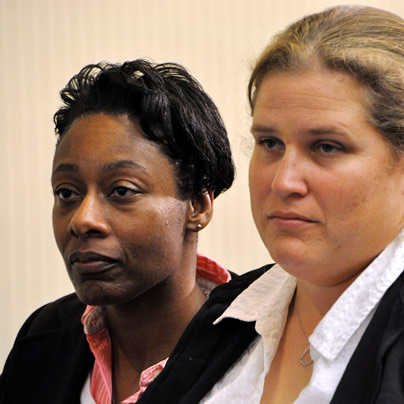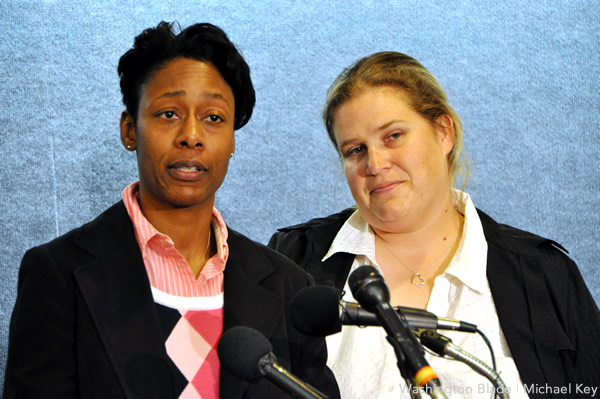News
Court rules against law barring gay couples from veterans benefits
Judge finds U.S. gov’t has no rational basis for withholding benefits from same-sex spouses


Tracey (left) & Maggie Cooper-Harris have sued to received veterans benefits that were denied under Title 38 (Blade file photo by Michael Key).
A federal district judge in California ruled on Thursday that enforcing Title 38 — the portion of U.S. code governing veterans benefits — to bar former troops in same-sex marriages from receiving spousal veterans benefits is unconstitutional.
U.S. District Judge Consuelo Marshall, a Carter appointee, grants summary judgment in favor of lesbian veteran plaintiff Tracey Cooper-Harris by determining the U.S. government lacks any rational basis in withholding these benefits. Marshall finds current law doesn’t advance gender equity or military purposes.
“Title 38 is not rationally related to the military’s commitment to caring for and providing for veterans benefits,” Marshall writes. “[T]he court permanently enjoins Defendants from relying on [Title 38] or Section 3 of [DOMA] to deny recognition of Plantiffs’ marriage recognized by the State of California.”
It wasn’t immediately clear Thursday night whether the ruling means the U.S. government is enjoined from blocking benefits for all gay married veterans or only the plaintiffs who filed suit in the case. However, the court declared the law unconstitutional, not just as applied to the plaintiffs.
Caren Short, staff attorney for the Southern Poverty Law Center, said Friday the decision applies “just to our clients Tracey and Maggie,” but believes the administration can implement the ruling on a nationwide basis.
“We’re hopeful that now that a federal court has declared these definition in Title 38 unconstitutional that the VA will be able take steps toward providing equal benefits now to everyone,” Short said.
Jon Davidson, legal director Lambda Legal, said whether the administration will apply the ruling only to plaintiffs or other gay veterans is yet to be seen.
“In most instances, DOJ takes the position that a district court ruling against a federal agency is not binding on the agency beyond the jurisdiction of the court issuing the ruling, but I do not know what DOJ will say here, if they do not appeal, as they may simply accede to the ruling on a nationwide basis,” Davidson said.
The Justice and Veterans Affairs departments didn’t immediately respond to a request to comment Friday morning on what their next steps will be as a result of the ruling.
The lawsuit, known as Cooper-Harris v. United States, was filed in February 2012 by the Southern Poverty Law Center on behalf of Tracey Cooper-Harris, a lesbian veteran of the Iraq and Afghanistan wars who was seeking veterans spousal benefits for her spouse, Maggie Cooper-Harris. Tracey was diagnosed with multiple sclerosis and later found it was connected to her service, but was unable to receive spousal disability benefits.
The Southern Poverty Law Center asked the court to overturn both Section 3 of the Defense of Marriage Act, which has since been overturned by the Supreme Court, and Title 38 with respect to its hold on spousal benefits for gay veterans on the basis that the laws violate due process under the Fifth Amendment.
In a statement provided by SPLC, Tracey Cooper-Harris expressed gratitude the court ruled in favor of granting veterans benefits that will benefit her and her spouse.
“Maggie and I have waited so long to receive the same benefits other married veterans and their spouses receive,” Tracey said. “We are overjoyed that the court has ended the federal government’s discrimination against gay and lesbian veterans and their spouses. Judge Marshall’s ruling confirms that the service of gay and lesbian veterans and the sacrifices of their spouses are valued equally in the eyes of the law.”
Even though the U.S. Supreme Court has struck down the Section 3 of DOMA, the U.S. government has still withheld veterans spousal benefits — such as disability and joint burial benefits — from veterans in same-sex marriages on the basis of Title 38. That law, which governs veterans benefits, defines spouse in opposite-sex terms independent of DOMA.
Just this week, the Washington Blade made public a letter from Secretary of Veterans Affairs Eric Shinseki stating that U.S. government is still withholding spousal benefits for veterans marriages. The letter says the department is still reviewing with the Justice Department whether the Obama administration can afford these benefits following the DOMA decision.
Stephen Peters, president of the LGBT group American Military Partners Association, commended the court for reaching the decision that Title 38 is unconstitutional.
“Title 38 clearly violated the constitutional rights of our military veteran families,” Peters said. “This decision sets our nation on a path to honoring and serving all of our veterans and their families, regardless of their sexual orientation.”
Doug NeJaime, who’s gay and law professor at University of California, Irvine, said the ruling is positive, but noted other statutes still exist barring veterans spousal benefits from flowing to same-sex couples.
“The ruling applies the reasoning of Windsor in a logical way and represents an important step forward on veterans benefits,” NeJaime said. “However, veterans benefits have traditionally not used a place of celebration rule, meaning that unlike in the general military context, same-sex couples would not automatically be eligible for benefits based on their marriage.”
It’s unclear how the case could proceed any further to higher court. U.S. Attorney General Eric Holder announced the Justice Department wouldn’t defend Title 38 against legal challenges that contest the law on the basis that it unfairly deprives same-sex couples of veterans benefits. The House Republican-led Bipartisan Legal Advisory Group, which had taken up defense of DOMA after the Obama administration stood down, withdrew as a party from the case in July.
SPLC’s Short she doesn’t believe anyone can appeal the case now that there are no opposing parties in the lawsuit.
“On the issue of Title 38’s constitutionality, it’s doesn’t appear that there will be anyone to appeal,” Short said. “The Department of Justice said that they also agreed that Title 38 is unconstitutional. They filed a brief in support of our motion for summary judgment, so it would be strange for them to appeal the ruling, which was essentially the outcome that they were advocating for. So on the issue of Title 38’s constitutionality, there isn’t likely to be an appeal.”
But Lambda’s Davidson said the Justice Department still may appeal the decision on the grounds that the federal district court in California doesn’t have jurisdiction to hear the case.
“While DOJ is not defending on the merits, it has been contesting whether the Title 38 challenge belongs in federal district court as opposed to the specialized administrative court that deals with VA benefit issues,” Davidson said. “The judge ruled against DOJ on that previously but and DOJ might appeal that issue at this point.”
District of Columbia
LGBTQ budget advocates fight for D.C. resources in a tough fiscal year
‘Trying to preserve life-saving services’ amid $1 billion cut

The months and days leading up to June are especially busy for LGBTQ Washingtonians. For one group, the DC LGBT Budget Coalition, which works year-round to ensure LGBTQ residents are represented and financially supported by the D.C. government, this time of year is their Super Bowl. Beginning in April, the D.C. Council and Mayor’s Office hold budget hearings for the next fiscal year.
With D.C.’s budget now under review, the Washington Blade spoke with Heidi Ellis, coordinator of the DC LGBT Budget Coalition, about the group’s top priorities and their push to ensure continued support for queer communities.
“The LGBTQ Budget Coalition was founded in 2020 at the height of the pandemic, as a way for the community to work together to advocate for key funding and policy changes,” Ellis said. “We recognized we were stronger together. A lot of groups are often pitted against each other for resources and dollars. This coalition was founded out of a need for unity. Since then, we’ve successfully advocated for more than $20 million in dedicated LGBTQ investments.”
In addition to coordinating the coalition, Ellis is the founder and CEO of HME Consulting & Advocacy, a firm that helps build coalitions and advance policy initiatives that address intersectional issues in the LGBTQ community. One of its most powerful tools, she explained, is direct outreach through community surveys.
“We actually do community surveys to see what people need and what’s top of mind,” Ellis said. “Of course, we also pay attention to the broader political landscape — like the current threats to HIV funding. That helps us prioritize.”
Because the coalition is comprised of more than 20 organizations across various sectors —healthcare, housing, community organizing — Ellis said its diversity enables it to connect grassroots needs to potential policy solutions.
“Our coalition includes service providers, community groups, health and housing advocates-folks who are deeply plugged into what’s happening on the ground,” she said. “They help determine our direction. We know we don’t represent every queer person in D.C., but our coalition reflects a wide range of identities and experiences.”
The insights gathered through those surveys ultimately inform the coalition’s annual budget proposal, which is submitted to the Council and mayor.
“That’s how we got to our FY26 priorities,” she said. “This year, more than ever, we’re fighting to protect what we’ve already secured — funding and policies we’ve had to fight for in the past. We know there’s concern around this budget.”
One of the challenges this year is that the D.C. government’s operating budget and some of its legislation must be approved by Congress. With a projected decline in tax revenue and a Republican-controlled Congress that has historically opposed LGBTQ funding, the Coalition has had to think strategically.
“Even before the situation on the Hill, the CFO projected lower revenue,” Ellis said. “That meant cuts to social programs were already coming. And now, with the $1 billion slashed from D.C.’s budget due to the continuing resolution, we’re not only fighting for D.C.’s budget and autonomy, but also trying to preserve life-saving services. Our message is simple: Don’t forget about queer people.”
This year’s proposal doesn’t include specific dollar figures. Instead, the Coalition outlines five funding priority areas: Healthcare, Employment & Economic Equity, Housing, Safety & Community Support, and Civil Rights.
Why no exact amounts? Ellis said it’s because not all solutions are financial.
“Some of our asks don’t require new funding. Others build on existing programs-we’re asking whether the current use of funds is the most effective. We’re also proposing policy changes that wouldn’t cost extra but could make a real difference. It’s about using what we have better,” she said.
When drafting the proposal, the Coalition tries to prioritize those with the most pressing and intersecting needs.
“Our perspective is: If we advocate for the most vulnerable, others benefit too,” Ellis said. “Take LGBTQ seniors. Some may have done well in life but now face housing insecurity or struggle to access affordable healthcare. Many in our coalition are elders who fought on the frontlines during the AIDS epidemic. They bring critical historical context and remind us that Black and brown communities bore the brunt of that crisis.”
“I love our coalition because it keeps us accountable to the moment,” she added. “If we center those most marginalized, we can make an impact that lifts everyone.”
In addition to healthcare and housing, safety remains a top concern. The Coalition has fought to maintain funding for the Violence Prevention and Response Team (VPART), a city-supported group that includes MPD, community-based organizations, and the Mayor’s Office of LGBTQ Affairs. VPART responds to crimes affecting the LGBTQ community and connects victims to legal, healthcare, and housing services.
“We’ve pushed to make VPART more proactive, not just reactive,” Ellis said. “The funding we’ve secured has helped survivors get the support they need. Cutting that funding now would undo progress we’re just beginning to see.”
At the end of the day, Ellis emphasized that this process is about far more than spreadsheets.
“A budget is a moral document,” she said. “If we’re not represented, you’re telling us our lives don’t matter at a time when we need protection the most. When people can’t get food, medicine, housing — that has a devastating impact. These are vital services.”
The DC LGBT Budget Coalition is urging residents to support a letter-writing campaign to D.C. Council members and the mayor. You can send a letter here: https://actionnetwork.org/letters/fully-fund-dcs-lgbtq-communities
Read the full FY26 budget proposal here: https://drive.google.com/file/d/1bTrENnc4ZazJTO6LPrQ3lZkF02QNIIf1/view
Arts & Entertainment
Washington Blade’s Pride on the Pier returns bigger than ever with two-day WorldPride celebration

The Washington Blade’s Pride on the Pier will be extended to a two-day celebration in honor of WorldPride coming to D.C. this year. Taking place on Friday, June 6 and Saturday, June 7 at The Wharf, this year’s event promises more entertainment, more community, and more pride than ever before — all set against the stunning waterfront backdrop of our nation’s capital.
With the addition of Friday, the party kicks off at 3 p.m., with the inaugural WorldPride Boat Parade at 7 p.m. As an Official WorldPride Partner event, the boat parade will feature 30 decorated boats parading along the Washington Channel. For information on signing up for the boat parade contact Stephen Rutgers at [email protected].
Saturday’s signature Pier Party kicks off at 12 p.m., featuring a drag show, DJ’s, streaming of the WorldPride Parade, and the iconic Fireworks Show Presented by the Leonard-Litz Foundation — one of D.C. Pride’s most anticipated spectacles.
“We’re expanding Washington Blade Pride on the Pier to reflect the excitement and momentum building for WorldPride in D.C.,” said Blade publisher Lynne Brown. “It’s a celebration of our community’s progress and a powerful reminder of the joy and visibility Pride brings to the heart of our city.”
Now in its seventh year, Washington Blade Pride on the Pier extends the city’s annual celebration of LGBTQ visibility to the bustling Wharf waterfront with an exciting array of activities and entertainment for all ages. The District Pier will offer DJs, dancing, drag, and other entertainment. Alcoholic beverages will be available for purchase for those 21 and older.
Pride on the Pier is free and open to the public, with VIP tickets available for exclusive pier access, hosted bars, and private viewing areas for the boat parade and the fireworks show. To purchase VIP tickets visit www.prideonthepierdc.com/vip.
Friday VIP: 5-9 p.m., enjoy an air-conditioned lounge, private bathroom, cash bar and complimentary drink.
Saturday VIP Session #1: 2-5 p.m., enjoy an air-conditioned lounge, private bathroom, catered food, and an open bar.
Saturday VIP Session #2: 6-9 p.m., enjoy the air-conditioned lounge, private bathroom, catered snacks and dinner, and open bar with a front-row view of the fireworks.
Event Details:
📍 Location: District Pier at The Wharf (101 District Sq., S.W., Washington, D.C.)
📅 Dates: Friday, June 6 & Saturday, June 7, 2025
🛥️Boat Parade: 7 p.m. (June 6). 🎆 Fireworks Show: 9 p.m. (June 7)
🎟️ VIP Tickets: www.PrideOnThePierDC.com/VIP
Event sponsors include Absolut, Capital Pride, DC Fray, Infinate Legacy, Heineken, Leonard-Litz Foundation, Mayor’s Office of LGBTQ Affairs, Relish Catering, Washingtonian, and The Wharf. More information regarding activities will be released at www.PrideOnThePierDC.com
Maryland
Md. schools plan to comply with federal DEI demands
Superintendents opt for cooperation over confrontation

By LIZ BOWIE | Deciding not to pick a fight with the Trump administration, Maryland school leaders plan to sign a letter to the U.S. Department of Education that says their school districts are complying with all civil rights laws.
The two-paragraph letter could deflect a confrontation over whether the state’s public schools run diversity, equity, and inclusion programs that the Trump administration has called illegal. The Baltimore Banner reviewed the letter, which was shared by a school administrator who declined to be identified because the letter has not yet been sent.
Maryland school leaders are taking a more conciliatory approach than those in some other states. Education leaders in Minnesota, New York, Colorado, Oregon, Vermont, and Wisconsin said they will not comply with the federal education department’s order, the demands of which, they say, are based on a warped interpretation of civil rights law.
The rest of this article can be found on the Baltimore Banner’s website.
-

 Opinions4 days ago
Opinions4 days agoIt’s time for new leadership on the Maryland LGBTQIA+ Commission
-

 The White House4 days ago
The White House4 days agoWhite House does not ‘respond’ to reporters’ requests with pronouns included
-

 Noticias en Español5 days ago
Noticias en Español5 days agoINDIGNACIÓN: ¡El transfeminicidio de Sara Millerey en Colombia nos cuestiona como sociedad!
-

 Arts & Entertainment4 days ago
Arts & Entertainment4 days ago‘Gay is Good’ Pride Pils Can Celebrates Frank Kameny’s 100th Birthday for WorldPride in D.C.












